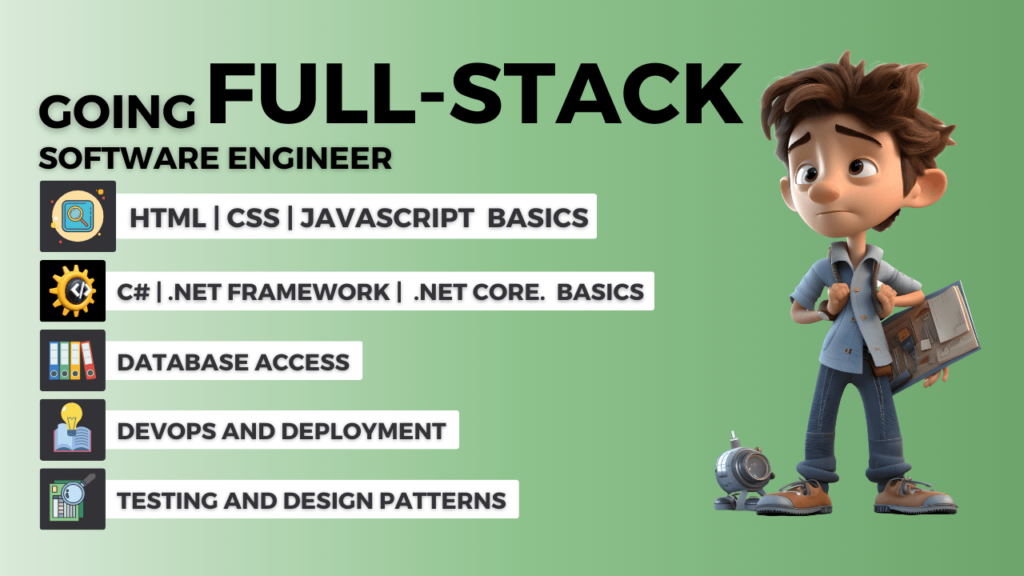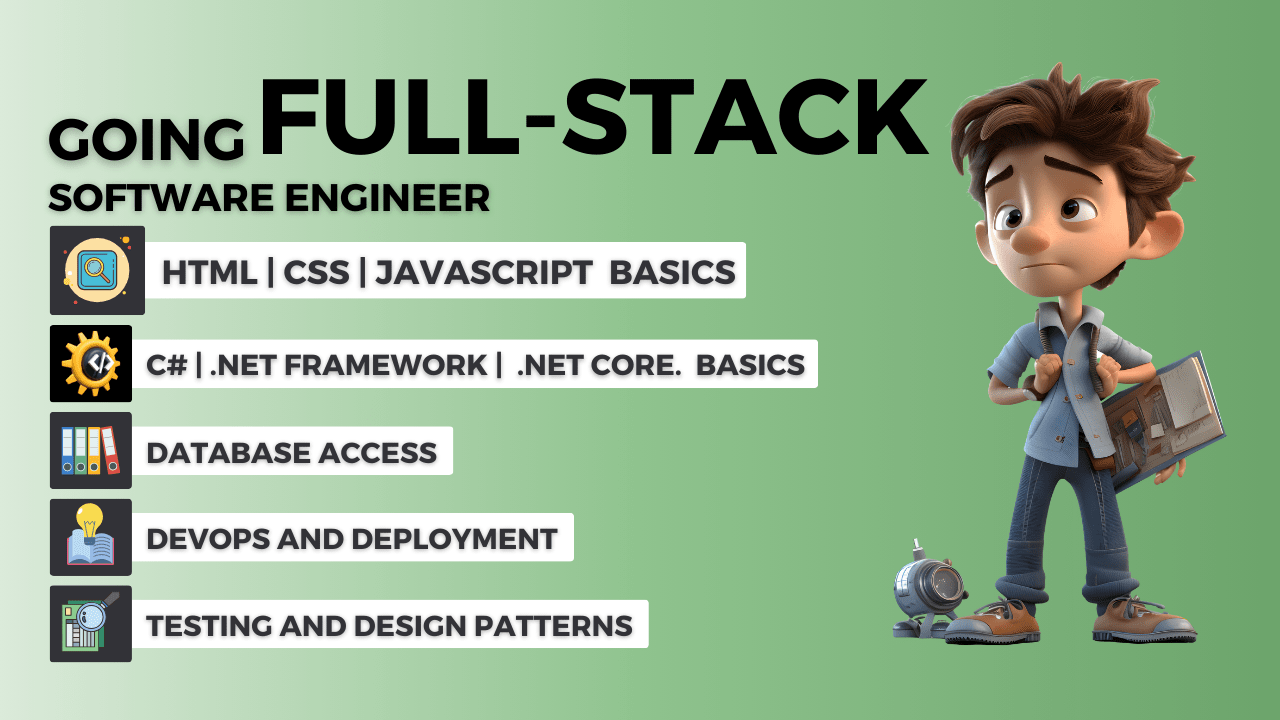How to become a .Net Full Stack Software Engineer?

In the vast field of rapidly growing technology, it becomes harder to understand what specific niche is all about and which one to enrol yourself into. In this article, we are going to discuss everything about .Net Full-Stack Software Engineering, and How to become a .Net Full-Stack Software Engineer?
By comprehensively understanding the topics listed below and following the step-by-step guide, you will be fit to step into the field of computer science through software engineering, and equip yourself to become a proficient .Net Full-Stack Software Engineer, capable of building end-to-end web applications using C#/Net Stack.
Let’s dive into the guide!
What is .Net Full-Stack Software Engineering?
.NET Full-Stack software engineering is a vast field that incorporates the skills and expertise to work on both the front-end and the back-end technologies using Microsoft’s .NET technology stack. The term “Full-Stack” implies that an engineer has the capacity to work end-to-end on a project using the user interface and service side technology.
.NET Full-Stack Software Engineering consists of multiple fields. Below is the breakdown of different key fields involved in the role of .NET Full-Stack Software Engineer:
Front-End Development
This involves the creation of User interface (UI) of an application where users can interact with an application. It includes the graphical user interface of a website. This means it requires working with the HTML, CSS, Javascript to build the user-friendly and responsive web interfaces. Meanwhile, .NET Full-Stack Engineers can also use frameworks like ASP.NET MVC or ASP.NET core for the front-end of web applications.
In other words, front-end development users interacting on a typical website are all considered as the user interfaces (UI), which is built by Front-End developers.
Back-End Development
Back-End Development is the process of designing and implementing the server-side logic of software applications. The Back-End system connects to the Front-End system to provide its functionality. This involves the use of API development, business logic implementation, and database management. Additionally, .NET Full-Stack Engineers use technologies like C#, ASP.NET, and ASP.NET Core for building the efficient back-end system.
Integration and APIs:
API is an Application Programming Interface, which may be also developed by the Full-Stack Software Engineers. They may also work on the integration of multiple components of the application. Integration and API development is done to enable the effective communication between various parts of the application with internal and/or external services for an application.
Deployment and DevOps:
Deployment and DevOps involve the deployment pipelines, which ensures the management of the infrastructure to run the application, ensuring the application scalability. DevOps allows the smooth operation of deployment and application running.
Testing and Quality Assurance:
Full-Stack Software Engineers play a vital role in implementation of testing strategy and quality assurance tasks. There are multiple types of tests that ensure the high quality and reliability of the whole application: Front-End and Back-End. This includes tests such as unit testing, integration testing and end-to-end testing.
Project Management and Collaboration:
Full-Stack Software Engineers may also play an important role in project management by collaborating with other team members, such as developers, and project managers etc. This allows the whole team to ensure effective team communication and project management, allowing the whole team to bring the valuable skills of all the employees together to produce high quality products efficiently and effectively.
Overall, there are multiple fields or aspects involved in .Net Full-Stack Engineer. They would be involved in end-to-end software development including playing a vital role in design, development, testing and project deployment. All of these abilities combined with the project management make the .Net Full Stack Engineer a valuable asset.
Step-By-Step Guide to become a Full-Stack Software Engineer
There will always be a number of ways to become a Full-Stack Software Engineer. But, this one would be comprehensive and easy to follow for the aspiring Full-Stack Software Engineers. The step-by-step guide doesn’t have to be followed in the exact same order. However, it would be essential and helpful to go through the entire step-by-step guide at least once regardless of its order.
Front-End Basics
- HTML, CSS, Javascript
- Front-End frameworks (e.g. Angular, React, Vue.js)
- TypeScript and Front-End build tools (e.g., Webpack)
C# and .NET Fundamentals:
- Variables, Data Types, and Operators
- Control Structures (if, else, switch, loops)
- Arrays, Lists, and Collections
- Methods and Functions
- Classes, Objects, Properties, and Indexers
- Inheritance, Polymorphism, Interfaces, and Abstract Classes
- Exception Handling
- Events and Delegates
- LINQ (Language Integrated Query)
- Common Language Runtime (CLR) and Common Type System (CTS)
- Assemblies and the Global Assembly Cache (GAC)
- .NET Framework Class Library (FCL) and Namespaces
- Transition from .NET Framework to .NET Core and .NET 5+
- .NET Core SDK, Runtime, and CLI
- Cross-platform development with .NET Core and .NET 5+
Web Development with ASP.NET:
- ASP.NET Web Forms vs. ASP.NET MVC vs. ASP.NET Core
- Razor Pages and Model-View-Controller (MVC) pattern
- ASP.NET Core Middleware, Routing, and Views
- Razor syntax and Authentication (Identity Framework)
- Web API (ASP.NET Core Web API) and Consuming APIs (HttpClient)
- WebSockets and SignalR
- RESTful API consumption from JavaScript, AJAX, and Fetch API
Database Access and ORM:
- ADO.NET basics
- Entity Framework Core (Code-First, Database-First, Migrations)
- LINQ to Entities
Testing and Design Patterns:
- Unit Testing with MSTest, xUnit, or NUnit
- Mocking frameworks (e.g., Moq) and Test-Driven Development (TDD)
- Design Patterns: Creational, Structural, Behavioral, Architectural
- Architectural Concepts: N-tier, Domain-Driven Design (DDD), SOLID principles, Clean Architecture
DevOps and Deployment:
- CI/CD pipelines (Azure DevOps, Jenkins, GitHub Actions)
- Containerisation (Docker)
- Deployment strategies, Monitoring, and Logging (Application Insights)
Advanced Topics:
- Asynchronous Programming (async/await) and Parallel Programming (TPL)
- Performance optimisation and Caching strategies
- Real-time applications with WebSockets and SignalR
- Microservices and Service-Oriented Architecture (SOA)
- Dependency Injection and Inversion of Control (IoC)
- Postman API for API Testing and Documentation
What are the advantages of becoming a Full-Stack Software Engineer?
Some of the advantages of becoming a Full-Stack software engineers are listed below:
Versatile
Full-Stack Software Engineers have the proficiency in both front-end and back-end technologies that allows them to be able to work on a wide range of tasks through the projects, and have a comprehensive view of the project, which gives them with special advantage of being able to add more value to the all aspects of the project.
End-to-End Development
Full-Stack Software Engineers are capable of working end-to-end on projects, meaning that they can independently work on software applications from A to Z. This enhances the team flexibility as well as the quality of software application.
Efficiency
The fact that Full-Stack Software Engineers have the capability to work end-to-end on projects. Hence, they are naturally considered to be more efficient whether it is the absence of any other team member that causes the disturbance to the project or improving the technical communication gaps between the team members for the project. Due to their unique knowledge in all aspects of the software application, they can be extremely efficient in understanding the ins and outs of software application, which is vital to any company and team to produce a high quality product.
Holistic Understanding
Full-Stack Software engineers have a holistic understanding of the software applications, improving the decision making and troubleshooting abilities for the team.
Cost-Effectiveness
Due to the wide range of skills and knowledge of Full-Stack Software engineers. They are tremendously important in the cost-effectiveness of the project.
Strong Job Market
Full-Stack Software Engineers have a great flexibility, which means they have the competence to work through projects end-to-end. It also means they can be trained on multiple roles or specialise in a particular skills set according to the company.
What is the Salary of a Full-Stack Software Engineer?
There are always multiple factors influencing the salary of any particular job, and Full-Stack Software Engineers aren’t different. Some of the factors that can affect the paycheck you receive are: location, experience, company etc.
According to Glassdoor and Indeed, the FullStack Software Engineer average salary in the UK can range from £57,178 to £57,585 yearly. It would translate £4,764.83 to £4,798.75 before tax.
Bear in mind, the UK is also known for its unpleasantly high taxes. Hence, you can simply go to MoneySavingExpert to calculate the salary yourself. Moreover, you can visit the UK’s gov website to check the latest tax rates for your job.
How many hours do the Full-Stack Software Engineers work?
Full-Software Engineers would typically work 40 hours a week. However, depending upon the experience and the nature of work, the hours could go up and down. For instance, an experienced Full-Stack software engineer working remotely may only have to work 4 to 5 hours sometimes depending on the project, as he is experienced with the programming languages and general skills required to get the job done, which means he can save a lot of time from fixing bugs and spending times on unimportant small things etc.
Conclusion
In order to become a proficient .NET Full Stack Software Engineer, one needs to learn both front-end and back-end technologies in the .NET stack. This includes a wide range of topics including Front-End and Back-End Development, Integration and APIs, Deployment and DevOps, Testing and Quality Assurance and project management. Overall, there are a number of advantages that a Full Stack Software Engineer has over the engineers with a handsome salary ranging from £57,178 to £57,585 in the UK.
Related Posts
How to become a .Net Full Stack Software Engineer? In the vast field of rapidly growing technology, it becomes harder to understand …
Question Q = Make a simple Login program that can take Username and Password and log in the system. How are we …


